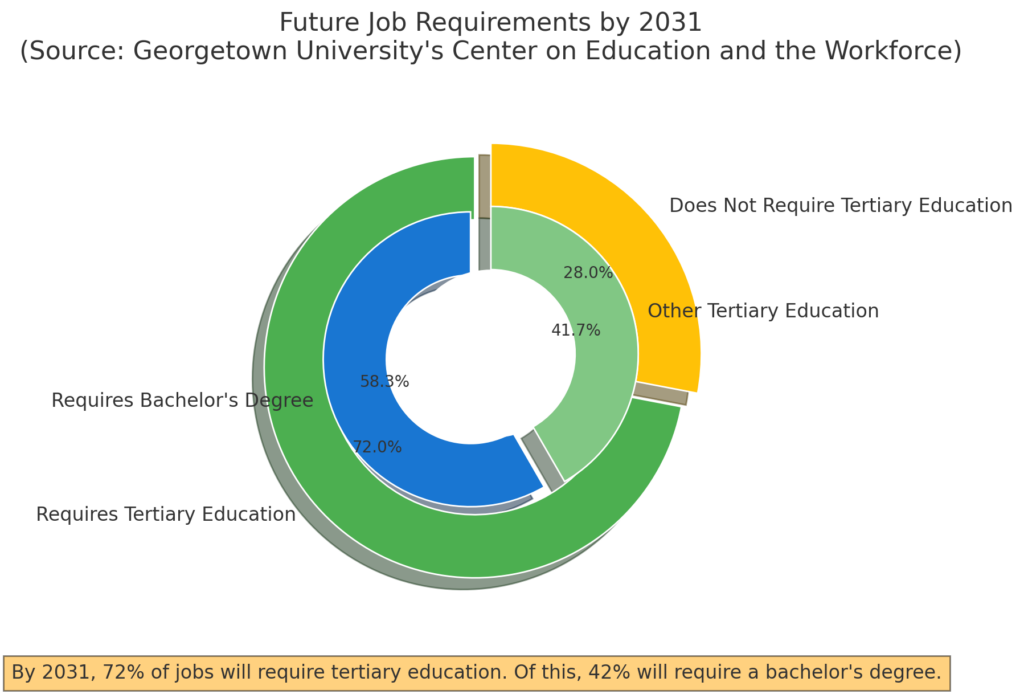Hiring styles have recently changed in how they approach job postings and selecting suitable candidates. The most notable change has been the uptick in hiring teams utilizing skills-based hiring practices.
This style of hiring goes directly against industry standards, which are degree—or competency-based hiring practices. How does this new style of hiring measure up to its predecessor?
In this article, we compare both hiring styles to help you decide which approach best fulfills your recruitment objectives.
What is Skills-based Hiring
Hiring based on skills is choosing a candidate based on abilities and competencies over formal qualifications. To do so, the selection process must evaluate candidates’ demonstrable skills and cultural fit with tests and interviews.
As you may have guessed, it’s considerably harder for recruiters to assess skills and validate candidates than just marking a checklist over a resumé. Degrees are so much easier to evaluate. Automated tools and AI can simply check an absurd quantity of resumés in minutes. So, when a company hires based on skills, it wishes for the best fit for that role. It means serious business.
Skills-based hiring is replacing degree-first recruiting worldwide based on the latest surveys. TestGorilla’s 2024 survey shows 81 % of employers now prioritize demonstrable skills, unlocking 94% larger talent pools in Latin America and Australia. TestGorilla surveyed companies report 90% fewer mis-hires and a 9% boost in retention, according to ADP and SHRM research.
Yet Harvard Business School warns many firms still list degrees by default, illustrating the gap between intention and execution. Harvard has been analyzing more than 500 unique job ads annually and has identified 769,980 distinct roles. Their study on job postings suggests that, while companies had paid skills-based hiring lip service, they hadn’t changed their hiring methods towards skilled people.
That happens because measuring skills is still a challenge for most companies. Think about it: now candidates have the tools to apply to 500-2000 job postings per month, and it’s hard to assess their skills individually. Degrees are verifiable credentials, and an AI simply has to find one to assess technical skills.
Skills-based hiring practices also directly address the lack of accessibility many people have when it comes to acquiring jobs due to a lack of a degree — despite having the necessary skills to fulfill a job’s requirements.
That being said, it’s still unclear on what level skills-based hiring is actually ingrained into companies, but those who firmly believe in doing so have been satisfied.
How Did Skills-Based Hiring Emerge
This style of hiring emerged post-pandemic, around 2022, and has become increasingly popular since then.
One reason for its popularity is the number of companies that were still operating remotely. These companies made an effort to diversify their talent pool, and due to differences in qualifications from different areas of the world, this style of hiring managed to even out the playing field, allowing candidates access to international opportunities from the comfort of their own homes.
Does Skills-Based Hiring Remove The Need For A Degree?
It does not remove the need for a degree.
A degree improves your chances of getting the job – but it is not the primary concern. Studying towards a degree equips you with the necessary skills. Skills-based hiring does not discourage studying towards a tertiary education qualification.
There are plenty of affordable master’s degrees that will aid in this, especially if you have undertaken a professional degree rather than a skills degree.
What is Degree-Based Hiring
Degree-based hiring refers to choosing candidates based on their formal qualifications, certifications, and degrees. The harder to get a certain certification, the more value it has.
For example, Scrum has two big institutions that certify managers: Scrum.org and the Scrum Alliance. They have many differences, but the relevant one is that Scrum.org has a harder certification to get, and thus it’s more valued among recruiters.
For this method, candidates are screened and selected based on their qualifications and appropriateness for the role. In degree-based hiring, AI and automated tools to check and analyze resumé data reign supreme.
Hiring teams place a lot of value on the degree the candidate possesses. If their qualifications are higher – such as a master’s or a doctorate – their value as an employee also increases.
There also needs to be a distinction between a skills degree and a professional degree. The former focuses on the skills that an individual wishes to hone, while the latter aids the individual in obtaining skills for a specific career path.
Training And Courses
Despite the ‘need for degrees’ allegedly decreasing, education after high school is still a requirement to develop skills and, as a result, get a job.
A recent Georgetown University’s Center on Education and the Workforce study claims that by 2031, 72% of jobs will require tertiary education or training to develop workplace skills. Of this number, 42% will require a bachelor’s degree.

However, this can change due to external factors like the economy and emerging technologies, among other reasons.
However, this can change due to external factors like the economy and emerging technologies, among other reasons.
Skills-Based vs. Degrees-Based Hiring: Quick Comparison
The difference between skills and degree-based hiring is that the first one picks candidates for proven abilities shown in tests or trial projects, while the degree-based hiring filters first by formal education. Skills-first widens the talent pool and speeds hiring, whereas degree-first can miss capable applicants and slow the process.
| Criteria | 🛠️ Skills-Based Hiring | 🎓 Degrees-Based Hiring |
| Main Focus | Candidate’s demonstrated competencies and abilities. | Candidate’s formal academic qualifications. |
| Hiring Philosophy | “Show me what you can do.” | “Show me your credentials.” |
| Candidate Pool | Significantly broader; includes self-taught and vocationally trained talent. | Narrower; limited primarily to college graduates. |
| Diversity & Inclusion | Highly inclusive; lowers socio-economic barriers. | It can limit diversity due to socioeconomic disparities. |
| Job Performance Prediction | Strong predictor; directly assesses relevant skills. | Indirect predictor: general knowledge proxy. |
| Retention Rates | Generally, higher. Candidates often stay longer. | Varies; potentially lower than skills-based. |
| Hiring Efficiency | Faster onboarding and quicker productivity. | Easier initial screening but may require more training. |
| Assessment Complexity | Complex; requires reliable tests and evaluations. | Simple initial filtering, based on standardized criteria. |
| Bias & Fairness | Potential biases in skill evaluation; manageable through structured assessments. | Can reinforce biases related to prestige or socioeconomic status. |
| Regulatory/Professional Necessity | Limited; less suited to strictly regulated roles. | Essential for licensed and regulated professions. |
| Innovation & Creativity | Encourages diverse thinking and innovation. | Risk of homogeneous thinking; limits creativity. |
| Degree Inflation & Talent Shortages | Reduces unnecessary barriers; helps fill skill gaps. | Often contributes to degree inflation and talent shortages. |
| Training Needs | Lower training cost due to existing skill sets. | Potentially higher due to general rather than specific skillsets. |
| Implementation Costs | May involve initial investments (skills testing, assessments). | Lower upfront cost; relies on established standards. |
| Market Trend (recent) | Growing rapidly, adopted widely in tech and emerging sectors. | Slowly declining but still strong in traditional sectors. |
| ⚖️ When to Choose Each Approach? | |
| Choose Skills-Based Hiring When | Choose Degree-Based Hiring When |
| Rapid innovation and technical skills dominate the role. | Regulatory or legal constraints require certain qualifications. |
| Diversity and inclusion goals are paramount. | The role requires extensive theoretical or foundational knowledge. |
| Industry faces talent shortages or skill gaps. | There is limited capability to assess individual skills thoroughly. |
| Practical skills are easy and economical to test directly. | The number of job applicants is massive and requires automation and AI. |
Why Companies Use One or The Other
Naturally, the hiring style also depends on the role you seek to fill. There are certain specialized fields where a degree is paramount, whereas skills-focused jobs can apply to multiple positions in different industries.
Jobs Where A Degree Is Required:
- Entry-level positions: In these positions, experience is not required to be successful, and candidates can work and gain experience.
- Law: This career sees candidates study for between two and four years, depending on their course type. This does not include specialized fields that require additional years of studying and taking the bar exam.
- Accounting: As a general rule of thumb, completing an accounting degree takes about four years, but extra effort is required for certifications such as a CPA.
- Education: To become a teacher, it can take up to five years to qualify for an education degree and a few more to earn a doctorate in education.
- Engineer: Depending on the engineering field, it takes up to six years to qualify.
- Medical and Health: This wide-scope field includes nursing and specialist surgeons. It can take up to 11 years for the candidate to qualify before they can begin practicing.
Jobs That Are More Skills-Focused:
- IT positions: Knowledge of coding, programming, network configuration, operating systems, hardware, and other skills is sought after.
- High-volume hiring roles: These are often spaces like call centers or retail spaces that see seasonal changes. They are usually required to fill positions quickly, and candidates’ skills are valued above all.
- Technical roles: These jobs require specific skills that are useful in different industries. These include technical writing, data analysis, project management, and search engine optimization.
- Sales and marketing: This requires candidates to have experience in the industry and the ability to prospect, outreach, critical-thinking, have product knowledge, and have problem-solving abilities
- Senior appointments: These refer to skills and experience developed over the years by the candidate. They carry more weight and show how well they will be suitable for the role rather than a degree.
- Retail and services: These require soft skills and technical skills to be successful.
- Administration: Requires knowledge of data, computer literacy, organizational skills, communication, and sometimes customer service.
Conclusion
Degree-based hiring, or competency-based hiring, has been the main method of filling vacant positions for many years; however, for the past few years, a new style of hiring has emerged: skills-based hiring.
Particularly for IT positions, we’ve noticed that talented developers often lack an official certification or education but still have great technical skills. Identifying these is key to establishing a solid recruitment process that allows you to evaluate a candidate’s experience and skills.
If you’re looking for IT talent, contact us. We can help you scale your team in less than two weeks with candidates who match your requirements.
Degree-based hiring, or competency-based hiring, has been the main method of filling vacant positions for many years; however, for the past few years, a new style of hiring has emerged: skills-based hiring.
Particularly for IT positions, we’ve noticed that talented developers often lack an official certification or education but still have great technical skills. Identifying these is key to establishing a solid recruitment process that allows you to evaluate a candidate’s experience and skills.
If you’re looking for IT talent, contact us. We can help you scale your team in less than two weeks with candidates who match your requirements.




